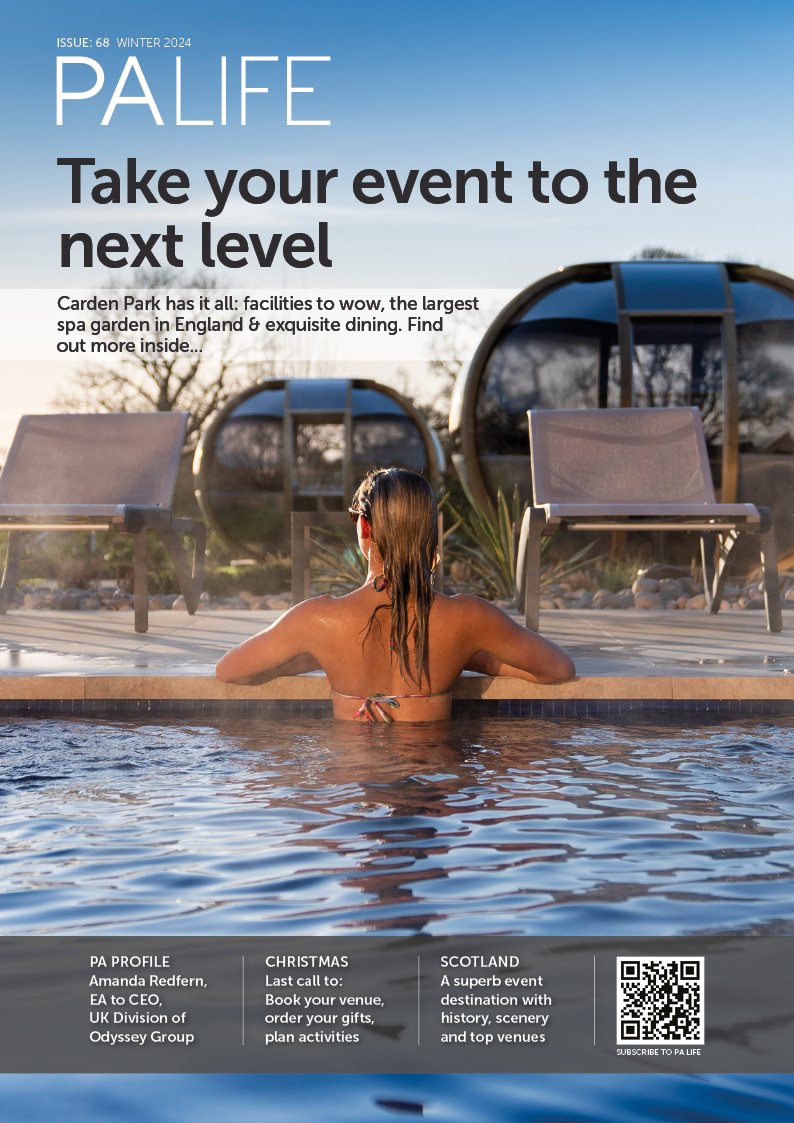The PA’s role is fast diversifying, with involvement in events having become a fundamental element of their daily work life. PA Life recently partnered with agency Top Banana to find out more in the #PAEventTips survey
As PAs gain greater recognition within senior leadership teams, managing events has developed into a significant area of responsibility. Around 63 per cent of PAs are involved with five or more events a year and 59 per cent of PAs spend a day or more each week on event planning. The remit of the average executive assistant has expanded to include everything from organising monthly off-site board meetings through to the annual conference for 500 delegates.
The most common event lead time is one to three months and around 70 per cent of all events have a lead time of less than three months. This relatively short period means the time-saving offered by working with a venue-finding agency can be of real value. On top of short lead times, the #PAEventTips survey found that PAs work on a large variety of events, from off-site meetings, away days and conferences, to leadership and team-building events and, more often than not, the office Christmas party.
Venue finding is the most common aspect of event planning that respondents are involved in, followed by logistics and delegate management. The pressure is on for PAs when looking for venues. The complex administrative, legal and practical implications of the decision, combined with the bewildering amount of choice, is what prompts management assistants to hire experts in the field. Add to this the sheer variety of events and increased time pressures, and it’s easy to see why the majority of PAs seek venue expertise from a specialist agency, although it must be noted that more than a third (37 per cent) say they never use the services of a venue-finding agency.
Themed venues and blank canvas spaces are used less often, especially when a venue-finding agency is not in the picture. When an agency is involved there is also a greater chance that rural locations will be used, demonstrating the wider variety of options an agency might have at its fingertips. It may be that the reliance on hotels is seen as an easy option, driven by short timescales, pressure on a PA’s own time during the working day and limited knowledge of the availability of other kinds of event spaces.
Meanwhile, 66 per cent of all the 154 PAs surveyed said that sustainability has become more important in venue selection. This is likely to increase in future as rules surrounding corporate social responsibility tighten.
When using agencies, knowledge and first-hand experience were the most valued aspects of the service. Having a single point of contact and offering unusual options were also important. The advice of other PAs is highly prized here – most agencies are found through personal recommendation. Online searching is significantly less common, the #PAEventTips survey found. The ideal venue-finding team should understand the event’s needs as well as the culture of the business, plus take budget constraints into consideration. Agencies are expected to come up with ideas and options that are different yet still reflect the brand and that are a good fit for the company, as well as being within budget.
The survey found that agencies are a way for PAs to achieve tasks outside their core skillset, or to fulfil duties the PA doesn’t have time to do personally. One of the most common challenges faced by assistants is communication with the venue. One point of contact is called for and that person must be responsive and available to deal with any queries and modifications. Flexibility in accommodating last-minute changes and being able to deal with issues arising with very little notice were also cited as important factors by those PAs working with venue-finding agencies.
To find out more about the services offered by Top Banana, see the website at top-b.com
Key event organising challenges
• Coming up with new and fresh ideas for venues
• Finding a venue of the right size and in a suitable location
• Availability of appropriate venues – especially with short timescales
• Lack of time – event management demands a lot of attention to do the job properly
• Getting everything right on the day, with all contingencies covered
• Keeping within an agreed budget
• Management of delegates and speakers
Top tips from the survey’s Twitter feed
• Plan, plan and plan some more – use spreadsheets and checklists to keep track
• Be totally organised from start to finish
• Visualise what is needed, anticipate problems and be very clear about your brief
• Communicate regularly with the venue and have one point of contact only
• Visit the venue before you agree the contract, build rapport and ensure every need is understood
• Allow enough of your time to plan and organise properly
• Consider using an agency to minimise stress, gain expertise and cover yourself legally and logistically












